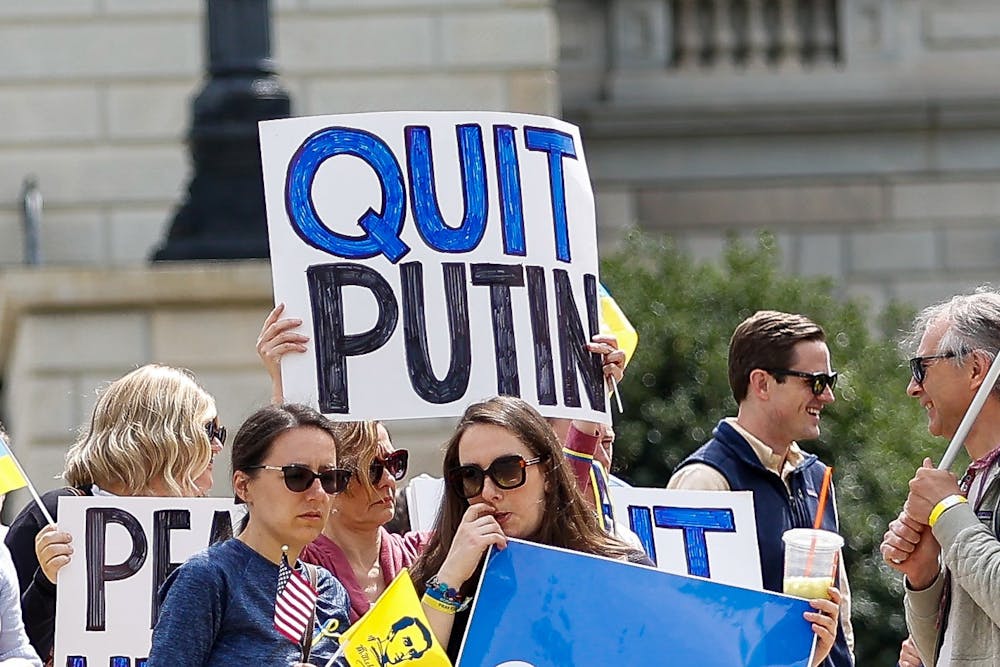Some USC students have ties to Ukraine and Russia, and their struggles during Putin’s war should not be overlooked. Their mental health has been affected by frantically stressing about the well-being of their family in Russia and Ukraine, on top of academic stressors.
Some have echoed that America should not be involved in this war, with the mentality that it does not affect us, so we should not care. However, major damage could be done if our country does not retaliate against dictators like Putin.
The truth is that Putin and his henchmen do not represent the will of the Russian people.
All USC students should do their part to be empathetic towards the Ukrainian and Russian people and listen to their stories.
A third-year physics student from Russia, who wished to stay anonymous, said the war could result in them ending their studies at USC due to their inability to pay.
"The whole economy of Russia just like collapsed overnight ... All of my Russian bank accounts that I was able to use here before are now, I cannot pay with cards that I had. I do have American bank account and some money on that, and I also have a job on campus, with that I was able to not be completely out of money," the physics student said.
The physics student is afraid to reveal their Russian identity. They said they feel like the egregious actions of Putin's regime will cause people to direct their anger at Russian people like them.
"I don't feel comfortable saying to strangers, when they hear my accent, then they're like 'oh, where are you from?' I don't feel comfortable telling them that I'm from Russia," the physics student said.
No one should not have to hide who they are due to fear of backlash. All should feel welcome in America, especially at USC.
In February, Congressman Eric Swalwell advocated to expel Russian students from college campuses. He later clarified that he meant he want to punish students of Russian oligarchs. Though it is good that he clarified his statement, we have to be careful with making blanket statements that can yield dire consequences.
The physics student said Swalwell’s remarks were "terrifying and really heartbreaking that the people of power think such things" but still believes the majority of people have enough common sense to not discriminate against Russian Americans.
Keren Karmiel, a first-year political science and philosophy student serves as the president of the Russian club and has relatives in Russia and Ukraine.
"The actions of a government never necessarily reflect on the people in situations like this," Karmiel said.
One way Karmiel distances herself from the Russian government and supports Ukrainians is through the Russian club.
"We started creating posters right away to distribute with a Linktree on it ... (with) resources on how to donate to Ukraine, live updates, podcasts, links," Karmiel said. "We've also been working on trying to set up donor drives and a congressional letter-writing campaign."
What these Russian students and their families are experiencing is not their fault — it's the Russian regime's fault. This is something people like Swalwell fail to see — If Ukrainians can show empathy towards them, so can we.
Two Ukrainian students, Nathan Dolbir, a third-year computer science and political science student, and Miriam Rozin, a second-year mathematics student, both said they hold no resentment towards the people of Russia.
"It's terrible that the Putin regime is sending conscripts to go invade, whether they want to or not," Dolbir said.
Not only are Putin's actions affecting Russian students, but also the Russian studies department at USC.
Many students and faculty in the Russian department have families that reside in Ukraine and Russia. Alexander Ogden, a Russian professor, said he noticed how those students have not been able to focus as clearly due to the war.
Dolbir, one of Ogden's students, opened up about the concern he has for his family in Ukraine. He has a cousin that lived in Kyiv when the war started who fled the city for safety.
"It's scary to think about how something may happen in the future," Dolbir said.
Rozin has family that still lives in Ukraine, some of which are in hiding. She also has an uncle who was drafted to patrol Ukrainian land.
The physics student said they are uncertain if their friends will be drafted into the war.
"I think I know two of the people, we were in school together and they were like the upperclassmen. They have a draft this spring, so they're required to go to the military for some time, but they're not there and I hope they don't go because there is no guarantee that they won't be sent on the actual battlefield in Ukraine," the physics student said.
The extent of Putin’s war is widespread and it is emotionally distressing for everyone. As USC students, we should not succumb to the anti-Russian American rhetoric. We should not say that Putin's war does not affect us, because if it affects some of our Gamecock family, then it affects the entire community.
We need to abide by the Carolinian Creed and demonstrate our concern for them and support them during these dark times.

